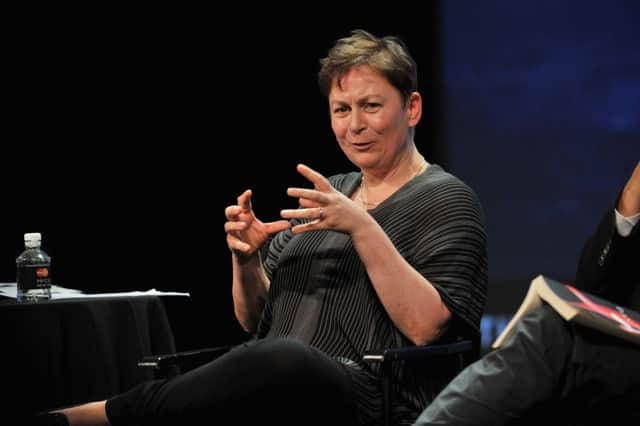David Robinson looks back on the Edinburgh Book Festival


If I buy a copy of The Green Road,” asked a woman in the Main Tent at the end of Anne Enright’s event, “would you come and read it to me?”
It sounds cheesy, but it wouldn’t if you’d been there. Take that scene in it when Dan, favoured son of Rosaleen, the horrendous, selfish matriarch of the Madigan family, revealed that he was thinking about being a priest, when she “gave a kind of moan that started soft and went long and there was a kind of speaking to its rise and fall” before “looking, very carefully, at nothing”.
Advertisement
Hide AdThat, you might think, would be quite hard to do – until Enright gave precisely such a moan herself, looked carefully at nothing, and carried on with a bravura performance of an Irish mammy eating and crying at the same time as unconsciously (and sometimes consciously) messing up her brood.


Or again, how about that scene in which in which Constance, Rosaleen’s much put-upon daughter, does the Christmas Eve shopping? Has any other scene – this was set in 2005 – ever as perfectly captured the mad exuberance of Celtic Tiger Ireland as her Christmas Eve trawl of the supermarket aisles for everything to ensure a perfect family Christmas?
If there is, has anyone read it as well as Enright did, with that perfectly timed pause before, having left the heaving supermarket behind and set off home, Constance realises she’s forgotten her mother’s favourite vegetable, the Brussels sprout?
Enright said she was a scrapper, and maybe she needs to be. Although she has been appointed Irish fiction laureate, the female voice doesn’t get much official recognition in the Irish literary tradition (the 1991 Field Day anthology of Irish writing, she pointed out, didn’t include a single women writer and even 20 years on not much had changed). “And although there’s a certain amount of freedom in that, when you write in your own voice and you’re not listened to, you start not to hear yourself any more.”
Talking about his new novel The Blue Guitar yesterday morning, her fellow Hibernian Man Booker winner John Banville was – predictably – more retrained and detached, yet oddly enough he did confess to a crime.
The novel’s protagonist, a painter whose muse has deserted him in middle age, is a stealer of small things. Artists are like that, said Banville, but usually just metaphorically “borrowing” from other artists’ work. “The only thing I’ve ever stolen was a beautiful hardback copy of Dylan Thomas’s Collected Poems from Wexford County Library,” he said. “I hid it behind the shelves for six weeks to see if nobody noticed its absence, and when they didn’t I stole it. However, I’ve left €2,000 to Wexford library in my will to try to make up.”
Advertisement
Hide AdHow does a small country get such a good track record in churning out writers like those two? You need to start with people like David Marcus (1924-2009) who not only edited the New Irish Writing page on the Irish Press (1968-86) but also edited about 30 collections of Irish short stories, including starting off the anthologies of them published by Faber.
Deirdre Madden, who edited the latest of these (entitled All Over Ireland), paid heartfelt tribute to him and read extracts from three writers she’d picked – Mary Morrissey, Michael Gilligan and Colm Toibin. All three were exemplary, but even though Madden pointed out how the stories often addressed contemporary life, they were hardly as experimental as you’d expect from the country that gave us Joyce and Beckett.
Advertisement
Hide AdIrish writers, though, don’t have to face up to a fraction of the challenges Turkish writer Elif Shafak has to confront even when writing a novel set in the 16th century such as her latest, The Architect’s Apprentice, where the architect in question is Mimar Sinan, many of whose 300-plus buildings still survive in Istanbul. Shafak’s opposition to cultural and political nationalism in contemporary Turkey is so fundamental to her work, which defies the denuded vocabulary of modern Turkish by bringing back the adjectival richness of vocabulary under the Ottoman Empire. “Words live longer than human beings,” she said, “and I always try to aim for multiplicity and openness.” Ironically, for the last 14 years she has done that largely by writing in English.
Say what you like about Rory Stewart, but the one thing he’s not is predictable politician. Then again, as he pointed out, this is the least predictable that politics has ever been: even five years ago, no-one could imagine Iraq’s boundaries collapsing and a so-called Islamic state of seven million forming in an area the size of the UK. British politics is in a similar flux, and when walking recently between his Penrith constituency and his father’s home in Crieff, he found people far more divided than he had expected. This seems to go against the thesis of a documentary he made last year, in which he argued that communities north and south of the Border had vast amounts in common, and certainly far more than most politicians realise.
I’d like to have heard Alistair Moffat’s take on that, but given that he told his audience on Saturday that there wasn’t any real difference between being a Northumbrian and a Borderer, I suspect he’d agree.
Writing Scotland: A History from the Earliest Times (published next month), he tried to include as much “history from below” as possible – not the doings of kings, queens and politicians, but of the ordinary people working the land – as, even as recently as a century ago, 2.1 million of us did. No-one writes more eloquently than Moffat, right, on how Scotland’s landscape has moulded us, and questions ranged from SNP policy on Scots in schools to the Gladstone’s electioneering, to the splendour of the site being excavated at the Ness of Brodgar reflected his audience’s fascination.
Another takedown of received wisdom came from Johann Hari’s polemic against the war on drugs. “You almost never change people’s minds by telling them they are wrong or citing facts,” he noted. “You do it by telling stories.” If, as chair Kevin Williamson pointed out, there are two drugs-related deaths in Scotland every day, we clearly need some new stories about them.
So that’s that. A crash course in modern Irish writing with two Man Booker winners, a magical tale from 16th century Istanbul, and books that forced new thoughts across the synapses on drugs policy, history and nationalism. Only a fraction of what I’ve learnt this month in Charlotte Square.
The tents start coming down tonight, but I’m missing them already.